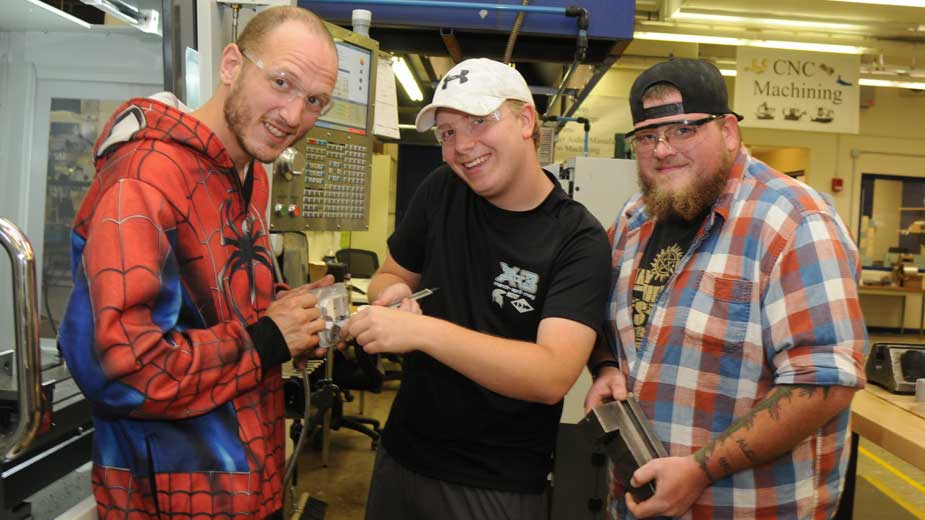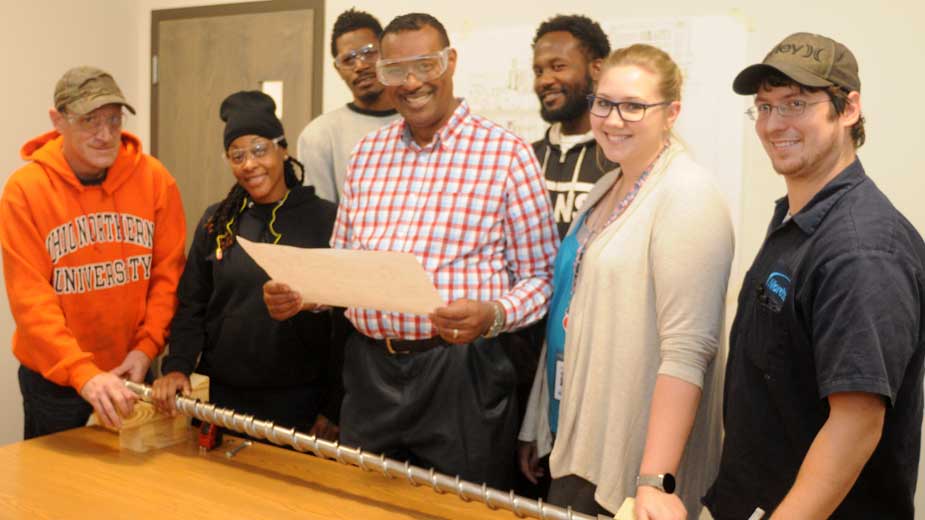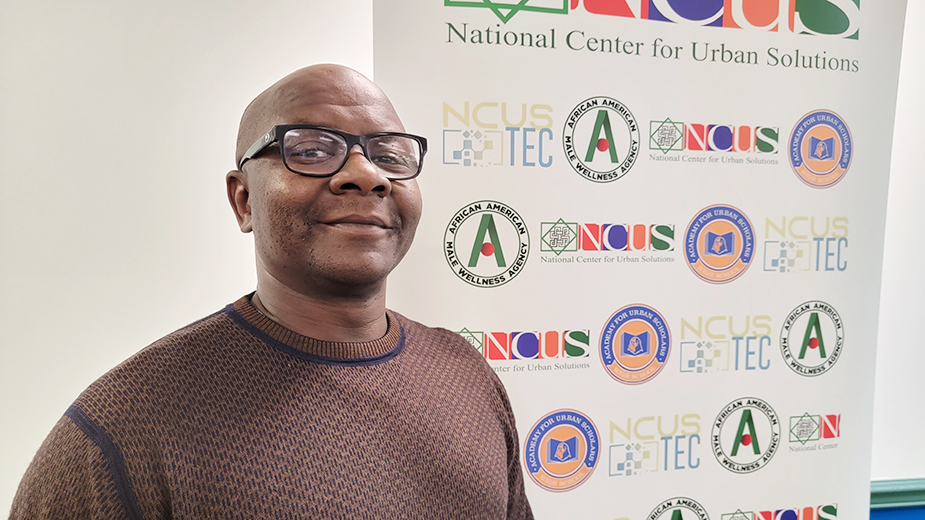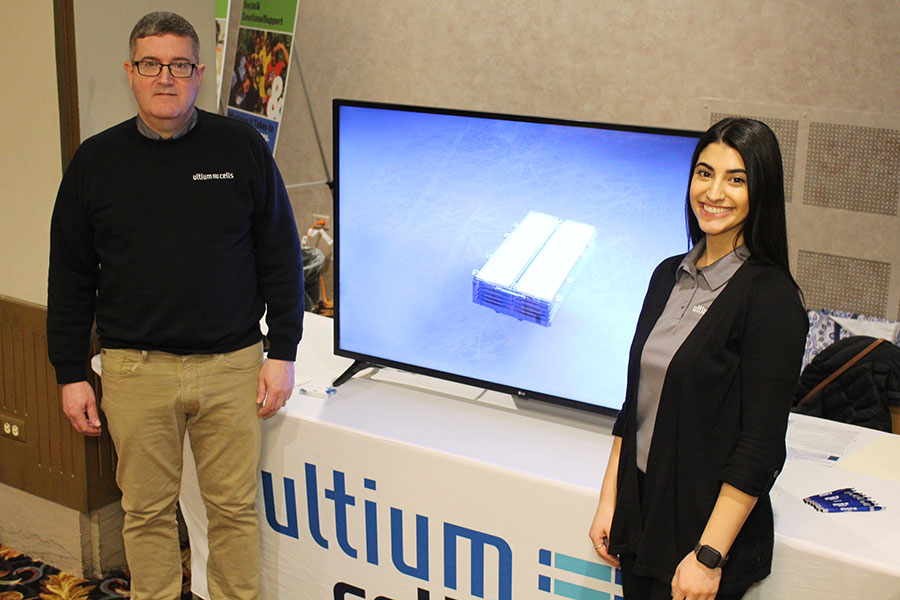WorkAdvance Program Fills Workforce Gaps
YOUNGSTOWN, Ohio — Lifting workers out of low-wage-jobs, providing sustainable careers and giving people a second chance are some of the ways a job-skills training program is changing lives – and reversing the brain drain plaguing our communities and the future of the region.
WorkAdvance is an initiative led by the Mahoning Valley Manufacturers Coalition to jump-start a career through paid technical training at no cost to participants. As aging skilled workers are retiring and young adults are leaving the region, the goal of the collaboration is to create a modern skilled workforce.
The program demonstrates the urgency – and one of the solutions – The Business Journal seeks to address in our 15-month project, Brain Gain: Building a Culture of Entrepreneurship and Promoting Workforce Development.
The Manufacturers Coalition strategically partnered with Nordson Corp., Youngstown Area Goodwill Industries, Eastern Gateway Community College and Mahoning Youngstown Community Action Program to create a wrap-around initiative that meets people where they are in life and helps them attain skills to become successfully employed.
“There’s no one solution to keeping our young people here,” says Arthur Daly, vice president of the Youngstown campus of Eastern Gateway Community College. But he points to the WorkAdvance model of combining manufacturing, education institutions, training and social services as moving toward a solution. “This is what sells our community.”
The program provides a paid two-week career coaching workshop, 100 hours of paid technical training along with ongoing support essential for a successful transition into an entry-level skilled manufacturing position. It has led to full-time manufacturing careers at Nordson Corp. in Austintown for 13 out of 17 participants.
Ashley Woloschak, human resources specialist at the Austintown company, says five people completed the program the initial year. Four of those five remain employed with two being promoted and one receiving advanced training for promotion.
WorkAdvance can accommodate 12 participants and was filled this past year. Woloschak says of the 12, nine remain employed.
“This is the first time we’ve been able to connect all the dots through deep engagement through services, resources and employer,” says Jessica Borza, MVMC executive director.
An employer willing to pay for training was the needed piece to make the program work, Borza says, and the coalition is grateful for Nordson’s willingness to invest in WorkAdvance.

A barrier for unemployed or underemployed people is giving up income to pursue training. Many work two jobs to make ends meet and don’t have time for training. An employer able to pay people to train breaks that cycle, Borza says.
Partner members agree that Woloschak’s creative vision and risk-taking attitude led to the success of WorkAdvance. And it inspired Daly in developing EGCC’s partnerships with educational service centers in recruitment initiatives at a younger age. “We can’t wait for kids to come to us, we have to start going to them in middle school or sooner,” he says.
Nordson announced in 2016 that it would combine operations in Boardman, New Castle, Pa., and Pulaski, Va., into one manufacturing center on Victoria Road. The Austintown hub makes feed screws and components for injection and extrusion machinery. The expectation was for existing workers to transfer to fill 260 positions.
But to Woloschak’s dismay, many workers were of retirement age or had been with the company for 30-plus years and chose not to relocate their families here for less than five years. Many retired or took severance packages.
“We had at least 100 open positions to fill in Austintown,” she says.
Woloschak attended job fairs and solicited applicants, but the process was too slow for the number of positions to be filled. That’s when she reached out to the Mahoning Valley Manufacturers Coalition and was introduced to WorkAdvance.
It took several conversations, pitches and debates with company officials before Nordson executives committed to paying unknown, unskilled participants for up to eight weeks with no guarantee the investment would result in qualified personnel.
“It takes a lot of upfront cost to do this,” Woloschak says.
By working with OhioMeansJobs, Nordson is eligible for training reimbursement, up to 50% of trainees’ wages through On-the-Job Training, a federally funded program that helps employers hire and train individuals for long-term employment.
Borza is in talks with other employers to take part in WorkAdvance, and she explains to them how the full array of partners drives the program.
Mike Lutz is an advance precision machinist who teaches at Eastern Gateway. He provides skills training, including math, using measurement tools and other industry-related necessities.
The Mahoning Youngstown Community Action Program, or Mycap, and Goodwill Industries are frontline community organizations that see needs, deficiencies and desires of people working on changing their lives.
“Manufacturing has the power to change the poverty levels in our community,” says Marilyn Montes, director of operations and compliance at Mycap.
Specialized training, employment workshops and classes to increase math and communication skills are the basics. Mycap then provides a case manager and support coach to follow a participant for a year after training and employment.
“The No. 1 trait is that people want to work,” says Denis M. Robinson Sr., senior director of human resources and workforce development for Youngstown Area Goodwill Industries.
Helping a person with the cost of work boots or uniforms to get started, or bus vouchers for transportation remediate issues that hold people back in career development, Robinson says.
Providing that type of support and being able to give someone a second chance who made mistakes at a younger age or has a criminal record is monumental in making a difference in the community, he observes.
One of the biggest deficiencies for people wanting a career in manufacturing is poor math skills, Woloschak says. And that’s where EGCC and Goodwill tap into the AspireGED program for help.
Goodwill and Mycap use Community Block Grant funding for the program. Grants secured by MVMC in partnership with The Raymond John Wean Foundation cover the cost of the career readiness and skill straining.
Based on the initial success, MVMC is looking to expand the program and serve more manufacturers seeking skilled entry-level employees.
WorkAdvance is one of MVMC’s education and workforce sector models. These models are collaborations between industry and community partners to place people into or back into the workforce.
Because of statewide success with employment through sector models, Gov. Mike DeWine added $5 million in the state budget specifically for sectors.
The Mahoning Valley’s models, such as WorkAdvance and some of the paid apprenticeship partnerships and mentoring work being done with school children, are being duplicated around the state.
They will be featured at a manufacturers’ conference in Columbus at the end of October. Lt. Governor Jon Husted, who serves as director of the Governor’s Office of Workforce Transformation and InnovateOhio, is planning to visit with Borza and others this month to talk about the sector models.
Borza is encouraging more studies that look at outmigration to not only focus on higher education programs, but to include trade skills, certificate programs and apprenticeships.
Pictured above: (From left) Mark Davis, Michelle Ellis, Reginald Green, Robert Mitchell, job placement specialist/outreach with Goodwill Industries, Isaiah Fason, Ashley Woloschak, HR operation specialist with Nordson Corp., and Josh Gorman.
The Business Journal thanks its headline sponsors.
Copyright 2024 The Business Journal, Youngstown, Ohio.



